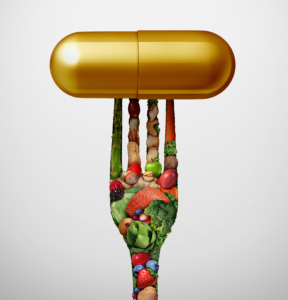
In an ideal world, people living with chronic kidney disease (CKD) and end-stage renal disease (ESRD) would all have easy access and a strong desire to follow a nutrient-dense, well-balanced, kidney- and/or dialysis-friendly diet.
Doing so could alleviate many of the burdens that accompany the disease and support overall improvement in quality of life. Unfortunately, this is not the case for the majority of patients. As a result, many patients are left struggling with big gaps in their nutrition whether they realize it or not.
What exactly is the “nutrition gap?” It really refers to two things.
First, it’s the difference between what nutrition a person is taking in and what they actually need. In the case of dialysis patients, nutrition gaps often result due to low protein and micronutrient intake, resulting in functional deficiencies, malnutrition, and protein-energy wasting.
Second, it means the time a patient takes to improve their oral intake to a point when they are consuming all the nutrients they need to thrive. Altering a behavior like nutrition intake does not happen overnight.
Supplements are often used to fill these gaps which allows the dietitian and patient more time to correct dietary intake without putting the patient in danger of worsening malnutrition, hospitalization, and other health issues.
When it comes to deciding when to use a calorie and protein supplement, clinicians can utilize laboratory data and composite nutrition scores like the 7-Point Subjective Global Assessment or Malnutrition Inflammation score to guide decision making. They can help indicate if additional oral nutrition supplements or IDPN or IPN therapies would be helpful.
For vitamin and mineral supplements, however, guidelines for CKD and ESRD the guidelines are sparse. Being familiar with the most common nutrient deficiencies is a good start.
Dialysis easily removes B vitamins and Vitamin C so it’s common to see these deficiencies in most patients. Additionally, looking for physical signs along with dietary recalls can help identify other types of nutrient deficiencies.
When selecting vitamins for patients with CKD and ESRD it is best to choose specially formulated supplements for renal disease from reputable companies. Renal vitamins will omit vitamins A, E, and K in order to prevent toxicity and medication interactions. Reputable companies will commit to product testing to ensure that contents of the supplement match what’s on the label and there are no potentially harmful contaminants present, an important factor for a health-compromised patient population.
Patient Care America has taken this into consideration and has now incorporated NutriRite Dialyvite 800 Multivitamin as part of the Oral Nutrition Supplement Program filling in vitamin and mineral gaps common in patients on dialysis. Our commitment continues to be providing the highest quality patient care offering optimal therapeutic outcomes and we hope to achieve this by offering integral supplements together with our IDPN and IPN protein nutrition therapy.
To learn more about the signs and symptoms of protein and micronutrient deficiencies, check out these resources:
